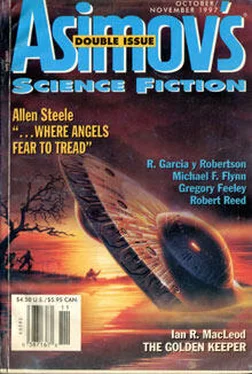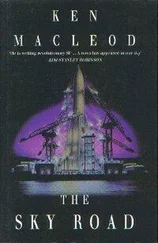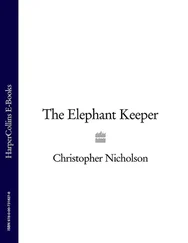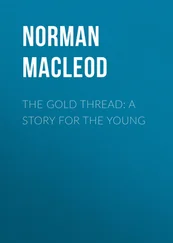Ian MacLeod - The Golden Keeper
Здесь есть возможность читать онлайн «Ian MacLeod - The Golden Keeper» весь текст электронной книги совершенно бесплатно (целиком полную версию без сокращений). В некоторых случаях можно слушать аудио, скачать через торрент в формате fb2 и присутствует краткое содержание. Год выпуска: 1997, Издательство: Dell Magazines, Жанр: Фантастика и фэнтези, на английском языке. Описание произведения, (предисловие) а так же отзывы посетителей доступны на портале библиотеки ЛибКат.
- Название:The Golden Keeper
- Автор:
- Издательство:Dell Magazines
- Жанр:
- Год:1997
- ISBN:нет данных
- Рейтинг книги:4 / 5. Голосов: 1
-
Избранное:Добавить в избранное
- Отзывы:
-
Ваша оценка:
- 80
- 1
- 2
- 3
- 4
- 5
The Golden Keeper: краткое содержание, описание и аннотация
Предлагаем к чтению аннотацию, описание, краткое содержание или предисловие (зависит от того, что написал сам автор книги «The Golden Keeper»). Если вы не нашли необходимую информацию о книге — напишите в комментариях, мы постараемся отыскать её.
is just out from Harcourt Brace, and his short story collection,
, will be out soon from Arkham House. In a departure in style and setting from his previous
tales, Mr. MacLeod takes us to an eerie time and place for a terrifying glimpse of…
.
The Golden Keeper — читать онлайн бесплатно полную книгу (весь текст) целиком
Ниже представлен текст книги, разбитый по страницам. Система сохранения места последней прочитанной страницы, позволяет с удобством читать онлайн бесплатно книгу «The Golden Keeper», без необходимости каждый раз заново искать на чём Вы остановились. Поставьте закладку, и сможете в любой момент перейти на страницу, на которой закончили чтение.
Интервал:
Закладка:
The only sign of recent human habitation was, in its way, fortunate. Just as the flames were starting to fade on my torch and I knew that I would have to turn back, I stumbled upon a larger and more roughly made brand that some other recent wanderer had dropped. It was only some passages later, when I was forced to put light to the thing, that I realized that the weight around the bottom, which I had imagined to be a handle, was in fact a human hand, severed at the wrist, and coated in the same ichor that I had noticed about the bones of the fallen animals in the gullies.
I gave a cry, then prized the thing off and flung it away. But the whole incident was too much for Alya. She turned and ran, sobbing, back the way we had come. I watched her go without attempting to call her back, but hoping for my own sake that the moonlight fanning from the narrow slits would be enough to guide her back to the surface, and that there she would wait for me. The severed hand, I noticed, shriveled and writhed through the process of some long-withheld contraction, moving briefly across the stone before finally collapsing in a twisted heap.
Fear is a strange thing. You, my reader, may well have imagined that it was with me at that moment as I stood alone in the depths of this strange, ancient palace, yet in truth, only now in reflection does a chill begin to gather, a sense of unease, almost as if a part of me was still there in that vast empty palace, forever lost and wandering.
Sadly, there is little else of interest in my explorations to relate. It occurs to me, though, that I should record some other of my impressions. In the absence of gold, perhaps I could keep at least a few of my creditors at bay by writing some fatuous history or novel about the place.
The tunnels are complex. I have almost the impression of an inwardly constructed fortress based around some central keep or core. The sudden turns, the many small alcoves and rooms into which a soldier or a priest might turn to lose or outwit an assailant, bear witness to that fact. The other point that would argue toward this are the shafts. There were many within the tunnels—and not of the narrow type that I have already described for the purposes of letting in light and air. These were wide and immensely deep, with narrow walkways at their sides, thankfully still sound, around which I was forced to make my way. The air that came up from these pits was shockingly foul. Much like the shallower versions of such shafts that I witnessed in the tombs at Thebes, I imagine that they were traps for the unwanted visitor. Either that, or they were used as the gullies were for the casting down of sacrifices.
But I remain, I confess, confused as to the essential purpose of these shafts. Now, weary as I am this night, it even strikes me that they were some vertical equivalent of the horizontal tunnels that I passed along, although their sides were so smooth, the depths so deep, that I cannot imagine what other use they could have been put to.
As to the passages themselves, I should record that the dots and carvings grew more intricate as I pressed further, although most were strange to me. I stopped, though, at a few places where somewhat newer slabs had been affixed to the walls, although these too were ancient, and many had fallen aside or cracked and crumbled. On these there was an almost Egyptian style of marking, although much changed. There were carved scenes too, that might once have been colorful when the gilt and the paint still held to them. I saw men and women with eyes much like Alya’s, gathering corn, drawing water, going about life’s unchanging tasks.
In other places, I saw what I can only take to be scenes from the construction of the great pyramids. Once again, many people were shown going about these tasks. There were supervisors too, and in places what I took to be the draped and oddly shifting forms of human figures—perhaps some kind of priesthood. I had passed several such slabs before I noticed another shape. Before that, I had taken it to be the destructive hacking of ancient graffiti. But the form recurred—if form it can be called—representing, I supposed, some feared chaotic deity whom the priests were supposed to keep at bay. Now, though, another explanation occurs to me. Certainly, if I am to turn my discoveries into a novel rather than a history, I would now say that the amorphous thing that the priests surrounded was the representation of an actual being.
Alya had spoken of the magics that her people had used to build the great pyramids and the other monoliths. Perhaps the truth is that they used this hideous shifting creature—for I can scarcely imagine that there is room in this universe for more than one—in the great labor of breaking and shifting the stones. I can well imagine that its escape from the priest’s control would have brought the downfall of a civilization, persistent rumors of ancient magic, and the many myths of some destructive flood or holocaust. It all makes a type of sense, although it strikes me now that night at Cul Holman is not the best place to dwell upon it.
Finally, I turned back within the tunnels, hoping that I would be able to find my way back out again. In fact, the choices were surprisingly easy. The foul shrieking wind that rose up, I was by now almost sure, from the pits themselves, seemed to push and lead me as I worked my way around them. When my borrowed brand finally died, I found that I was already near to the surface, and that the narrow upward shafts admitted threads of dawn. Thus my mood was calm as I walked back toward the square-set portals overlooking the desert. In this new brightness, I could almost glimpse the protective shadows of those long-dead priests standing guard around me, leading me on, murmuring prayers of protection.
In the last of the side-rooms into which I peered, drawn by a stronger glow of light, I saw a wider space than I had anticipated; a roof borne up by great squared pillars. The light shafts here were numerous, and angled in such a way that they crossed and threaded at a point near the hall’s—or temple’s, I might now call it—center, and threw its far reaches into flowing drifts of shadow. There, caught in the web of light, hung a central core that was ill-defined in shape. It was an illusion that I had become used to in my explorations, but still I felt drawn to cross the surprising vastness of the hall on the chance that I might at last have stumbled across some valuable relic.
As I drew close to the web of light, the ball of shadow it contained began to shrink, but, for once, it did not disappear entirely when I reached it. Lying as if recently discarded upon the floor, I found a lump of stone, black, multi-faceted, like some complex kind of dice. I have the thing beside me on the table now, and would record how many sides it has, if I were able to count them exactly. It is heavy for its size, and rubbed at my thigh in the pouch where I carried it. Even now, my flesh aches at that point, as if it were burned. The thing is too large to hide under the loose tiles beneath my bed where I hoard these notes and what little other wealth I have acquired here. To keep it from the prying eyes of my servants, I will bundle it up in my trunk that lies beside my valueless heap of starstones. If I spin it sufficiently well into the tale I plan to write, who knows? I may even be able to sell it.
What else is there to record?—little other than that Alya was indeed waiting for me beside the great blocks of the entrance way, sitting with her hands clasped around her knees and shivering even though she was in the full warmth of the rising sun. That same sun then led us back here to Cul Holman without confusion, although the way was long and weaiy, and it was the edge of another evening when we finally came into taste, sight, and hearing of its dust clouds and hammerings.
Читать дальшеИнтервал:
Закладка:
Похожие книги на «The Golden Keeper»
Представляем Вашему вниманию похожие книги на «The Golden Keeper» списком для выбора. Мы отобрали схожую по названию и смыслу литературу в надежде предоставить читателям больше вариантов отыскать новые, интересные, ещё непрочитанные произведения.
Обсуждение, отзывы о книге «The Golden Keeper» и просто собственные мнения читателей. Оставьте ваши комментарии, напишите, что Вы думаете о произведении, его смысле или главных героях. Укажите что конкретно понравилось, а что нет, и почему Вы так считаете.












